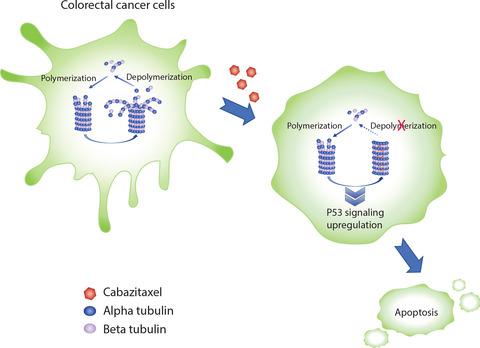当前位置:
X-MOL 学术
›
FEBS Open Bio
›
论文详情
Our official English website, www.x-mol.net, welcomes your
feedback! (Note: you will need to create a separate account there.)
Cabazitaxel suppresses colorectal cancer cell growth via enhancing the p53 antitumor pathway
FEBS Open Bio ( IF 2.8 ) Pub Date : 2021-09-08 , DOI: 10.1002/2211-5463.13290 Wen Zhang 1, 2 , Ruiqian Sun 3 , Yongjun Zhang 4 , Rong Hu 1, 2 , Qian Li 1, 2 , Weili Wu 1, 2 , Xinyu Cao 5 , Jiajian Zhou 4 , Jianfeng Pei 6 , Ping Yuan 1, 2
FEBS Open Bio ( IF 2.8 ) Pub Date : 2021-09-08 , DOI: 10.1002/2211-5463.13290 Wen Zhang 1, 2 , Ruiqian Sun 3 , Yongjun Zhang 4 , Rong Hu 1, 2 , Qian Li 1, 2 , Weili Wu 1, 2 , Xinyu Cao 5 , Jiajian Zhou 4 , Jianfeng Pei 6 , Ping Yuan 1, 2
Affiliation

|
There were approximately 1.93 million new cases and 940 000 deaths from colorectal cancer in 2020. The first-line chemotherapeutic drugs for colorectal cancer are mainly based on 5-fluorouracil, although the use of these drugs is limited by the development of drug resistance. Consequently, there is a need for novel chemotherapeutic drugs for the efficient treatment of colorectal cancer patients. In the present study, we screened 160 drugs approved by the Food and Drug Administration and identified that cabazitaxel (CBT), a microtube inhibitor, can suppress colony formation and cell migration of colorectal cancer cells in vitro. CBT also induces G2/M phase arrest and apoptosis of colorectal cancer cells. Most importantly, it inhibits the growth of colorectal cancer cell xenograft tumors in vivo. Transcriptome analysis by RNA-sequencing revealed that Tub family genes are abnormally expressed in CBT-treated colorectal cancer cells. The expression of several p53 downstream genes that are associated with cell cycle arrest, apoptosis, and inhibition of angiogenesis and metastasis is induced by CBT in colorectal cancer cells. Overall, our results suggests that CBT suppresses colorectal cancer by upregulating the p53 pathway, and thus CBT may have potential as an alternative chemotherapeutic drug for colorectal cancer.
中文翻译:

卡巴他赛通过增强 p53 抗肿瘤通路抑制结直肠癌细胞生长
2020年大肠癌新发病例约193万,死亡94万人。大肠癌一线化疗药物主要以5-氟尿嘧啶为主,但由于耐药性的发展,这些药物的使用受到限制。因此,需要用于有效治疗结肠直肠癌患者的新型化学治疗药物。在本研究中,我们筛选了美国食品药品监督管理局批准的 160 种药物,发现微管抑制剂卡巴他赛 (CBT) 可以在体外抑制结直肠癌细胞的集落形成和细胞迁移。CBT 还诱导结直肠癌细胞的 G2/M 期阻滞和凋亡。最重要的是,它在体内抑制结直肠癌细胞异种移植肿瘤的生长. 通过 RNA 测序进行的转录组分析显示,Tub 家族基因在 CBT 处理的结肠直肠癌细胞中异常表达。CBT 在结直肠癌细胞中诱导了与细胞周期停滞、细胞凋亡和抑制血管生成和转移相关的几个 p53 下游基因的表达。总体而言,我们的研究结果表明,CBT 通过上调 p53 通路抑制结直肠癌,因此 CBT 可能具有作为结直肠癌替代化疗药物的潜力。
更新日期:2021-11-03
中文翻译:

卡巴他赛通过增强 p53 抗肿瘤通路抑制结直肠癌细胞生长
2020年大肠癌新发病例约193万,死亡94万人。大肠癌一线化疗药物主要以5-氟尿嘧啶为主,但由于耐药性的发展,这些药物的使用受到限制。因此,需要用于有效治疗结肠直肠癌患者的新型化学治疗药物。在本研究中,我们筛选了美国食品药品监督管理局批准的 160 种药物,发现微管抑制剂卡巴他赛 (CBT) 可以在体外抑制结直肠癌细胞的集落形成和细胞迁移。CBT 还诱导结直肠癌细胞的 G2/M 期阻滞和凋亡。最重要的是,它在体内抑制结直肠癌细胞异种移植肿瘤的生长. 通过 RNA 测序进行的转录组分析显示,Tub 家族基因在 CBT 处理的结肠直肠癌细胞中异常表达。CBT 在结直肠癌细胞中诱导了与细胞周期停滞、细胞凋亡和抑制血管生成和转移相关的几个 p53 下游基因的表达。总体而言,我们的研究结果表明,CBT 通过上调 p53 通路抑制结直肠癌,因此 CBT 可能具有作为结直肠癌替代化疗药物的潜力。











































 京公网安备 11010802027423号
京公网安备 11010802027423号